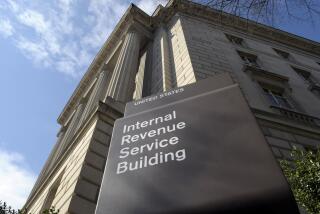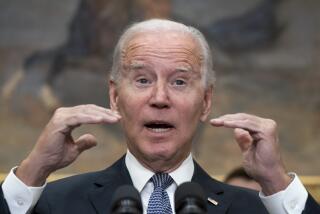Federal budget deficit a record $438 billion
- Share via
WASHINGTON — The federal deficit hit a new record in the just-completed 2008 budget year under the latest estimates from the Congressional Budget Office.
The record $438-billion shortfall for the budget year that ended last week is up from $162 billion posted last year. The previous record of $413 billion was posted in 2004.
The CBO said Tuesday that with the economy in a slump, revenues dropped by almost 2%. Corporate income receipts dropped by $65 billion, or nearly 18%. At the same time, individual income tax revenues declined by 1.6%.
The deficit is virtually certain to balloon even higher next year as the government sorts out the financial crisis and taps a $700-billion Treasury fund to buy toxic mortgage-related securities.
The next president may have to scale back campaign pledges as he inherits a likely deficit of more than $500 billion for 2009. But neither GOP standard-bearer John McCain nor Democratic nominee Barack Obama has offered much detail about what promises he wouldn’t be able to keep.
The latest figures for 2008 are somewhat of a surprise, being more than $30 billion higher than the CBO update issued last month and almost $50 billion higher than what the White House predicted in July.
The numbers also amplify President Bush’s poor record on the deficit. Bush inherited a budget seen as producing endless huge surpluses after four straight years in positive territory. That stretch of surpluses represented a period when the country’s finances had been bolstered by a 10-year period of uninterrupted economic growth, the longest expansion in U.S. history.
A recession in March 2001 and spending to fight the wars in Iraq and Afghanistan helped push the deficit to its previous record in 2004.
Major rounds of tax cuts enacted in 2001 and 2003 have also contributed to the deficit. Renewing them -- and their $200-billion-plus annual cost -- when they expire at the end of 2010 would make it extremely difficult to balance the budget any time soon.
A later promise to cut the deficit in half by the time Bush leaves office is in tatters, and virtually no one takes seriously his proposed path to a balanced budget by 2012.
The deficit numbers for 2008 represent about 3% of the size of the economy, which is the measure economists consider the most relevant. By that measure, the deficit is smaller than the deficits of the 1980s and early 1990s that led Congress and earlier administrations to cobble together politically painful deficit-reduction packages.
“Our children and grandchildren will be paying the price for years to come as they shoulder this growing burden of debt,” said House Budget Committee Chairman John M. Spratt Jr. (D-S.C.).
The Treasury Department is expected to release the official deficit tally by mid-month.
More to Read
Get the L.A. Times Politics newsletter
Deeply reported insights into legislation, politics and policy from Sacramento, Washington and beyond. In your inbox twice per week.
You may occasionally receive promotional content from the Los Angeles Times.










